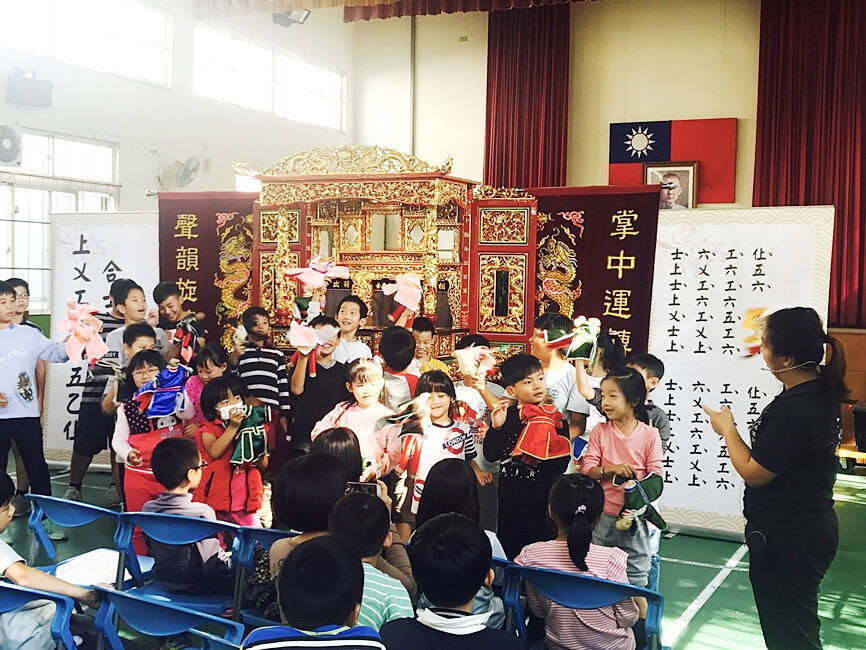A majority of Taiwanese, or 68.4 percent, feel that “native” languages are in danger of disappearing, a poll released yesterday by the Professor Huang Kun-huei Education Foundation showed.
Previous policies vigorously promoting Mandarin have crippled the development of native languages, foundation chairman Huang Kun-heui (黃昆輝) said.
Of the poll’s respondents, 37.2 percent said that the Ministry of Education’s policies effectively preserve native languages, he said.

Photo courtesy of the Taoyuan Department of Education
While 93.9 percent of those polled said that speaking native languages with family members is the best way to learn a language, 67.5 percent said their family members could not speak native languages, demonstrating that such methods are not the most effective, Huang said.
Citing Ministry of Culture data, Huang said that the use of Hoklo (commonly known as Taiwanese) has dropped by nearly 60 percent within the past three generations, while the use of Hakka has fallen 70 percent, and the use of indigenous languages has plummeted by almost 90 percent.
The less a language is used, the more likely it is of becoming endangered or extinct, and the preservation and restoration of native languages in Taiwan is a task that cannot be put off any longer, Huang said.
Foundation member Feng Ching-huang (馮清皇) said that about 64.9 percent of the respondents still used their native tongue daily.
Broken down into region, Tainan, and Yunlin and Chiayi counties had the largest percentage of people who speak a native tongue daily at 82.4 percent, followed by Taichung, and Changhua and Nantou counties at 73.6 percent, and Kaohsiung, and Pingtung and Penghu counties at 73.3 percent, Feng said.
The poll showed that the use of native languages dropped in conjunction with the respondents’ age, Huang said.
Feng said that 91.5 percent of respondents aged 65 or older used a native tongue frequently, followed by those aged 50 to 64 at 73.3 percent.
Respondents with a junior-high school education or lower used native languages the most, at 90.6 percent, followed by those with a high-school or vocational high-school education at 70.2 percent, Feng said.
National Cheng Chi University Graduate Institute of Taiwan History chairman Hsueh Hua-yuan (薛化元) said it is a basic human right to use one’s native language.
Government policies have previously infringed upon that right, resulting in the prevalence of Mandarin in education, government and mass media, Hsueh said.
The Development of National Languages Act (國家語言發展法) has provided a legal basis to help protect local languages, but the preservation and development of the native languages of multiple ethnicities is still an uphill battle, he said.

STILL COMMITTED: The US opposes any forced change to the ‘status quo’ in the Strait, but also does not seek conflict, US Secretary of State Marco Rubio said US President Donald Trump’s administration released US$5.3 billion in previously frozen foreign aid, including US$870 million in security exemptions for programs in Taiwan, a list of exemptions reviewed by Reuters showed. Trump ordered a 90-day pause on foreign aid shortly after taking office on Jan. 20, halting funding for everything from programs that fight starvation and deadly diseases to providing shelters for millions of displaced people across the globe. US Secretary of State Marco Rubio, who has said that all foreign assistance must align with Trump’s “America First” priorities, issued waivers late last month on military aid to Israel and Egypt, the

‘UNITED FRONT’ FRONTS: Barring contact with Huaqiao and Jinan universities is needed to stop China targeting Taiwanese students, the education minister said Taiwan has blacklisted two Chinese universities from conducting academic exchange programs in the nation after reports that the institutes are arms of Beijing’s United Front Work Department, Minister of Education Cheng Ying-yao (鄭英耀) said in an exclusive interview with the Chinese-language Liberty Times (the Taipei Times’ sister paper) published yesterday. China’s Huaqiao University in Xiamen and Quanzhou, as well as Jinan University in Guangzhou, which have 600 and 1,500 Taiwanese on their rolls respectively, are under direct control of the Chinese government’s political warfare branch, Cheng said, citing reports by national security officials. A comprehensive ban on Taiwanese institutions collaborating or

France’s nuclear-powered aircraft carrier and accompanying warships were in the Philippines yesterday after holding combat drills with Philippine forces in the disputed South China Sea in a show of firepower that would likely antagonize China. The Charles de Gaulle on Friday docked at Subic Bay, a former US naval base northwest of Manila, for a break after more than two months of deployment in the Indo-Pacific region. The French carrier engaged with security allies for contingency readiness and to promote regional security, including with Philippine forces, navy ships and fighter jets. They held anti-submarine warfare drills and aerial combat training on Friday in

COMBAT READINESS: The military is reviewing weaponry, personnel resources, and mobilization and recovery forces to adjust defense strategies, the defense minister said The military has released a photograph of Minister of National Defense Wellington Koo (顧立雄) appearing to sit beside a US general during the annual Han Kuang military exercises on Friday last week in a historic first. In the photo, Koo, who was presiding over the drills with high-level officers, appears to be sitting next to US Marine Corps Major General Jay Bargeron, the director of strategic planning and policy of the US Indo-Pacific Command, although only Bargeron’s name tag is visible in the seat as “J5 Maj General.” It is the first time the military has released a photo of an active